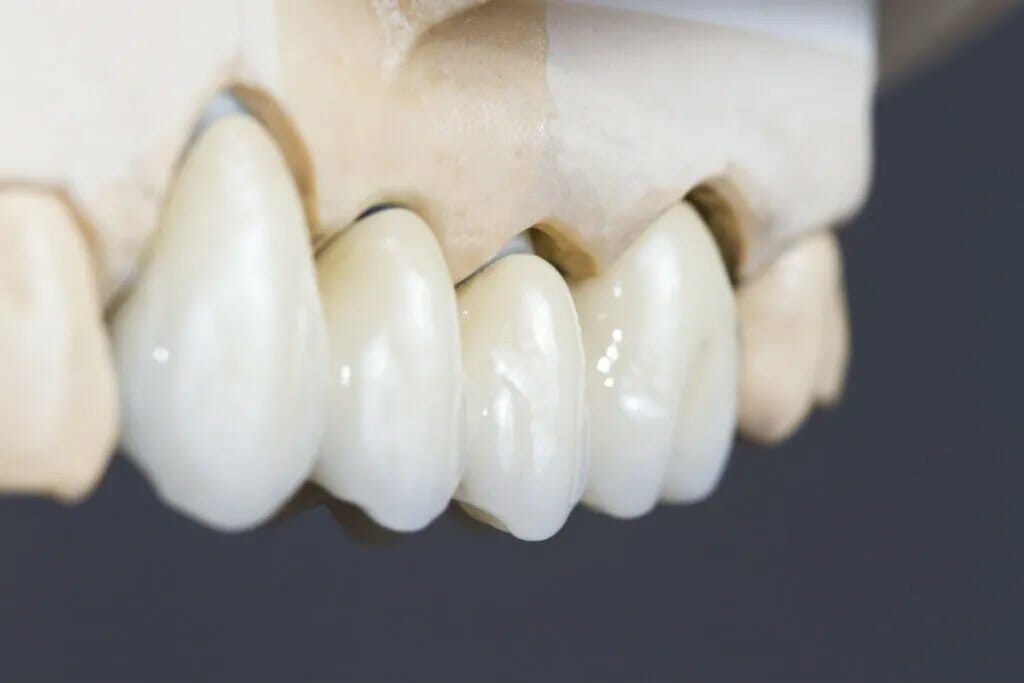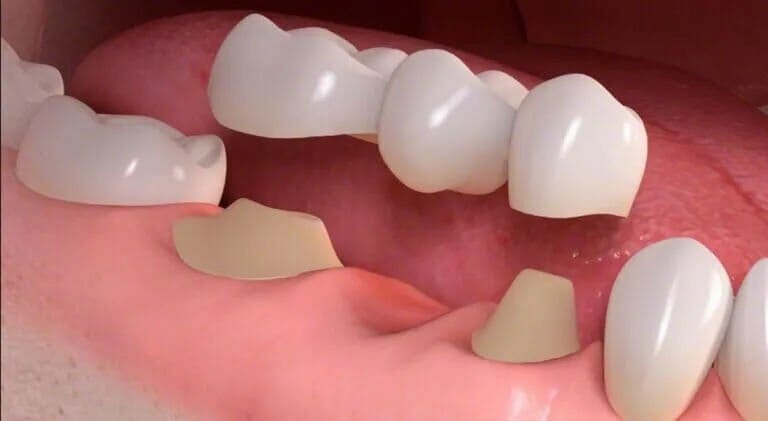At Enamel Republic, we provide long-lasting, beautiful Dental Bridges. Our Dental Bridges can help you to replace missing teeth with a convenient, non-removable solution.
Let's talk a bit about what a dental bridge is!
A dental bridge is a one-piece, non-removeable appliance that replaces one or more missing teeth. The ends of the bridge are made up of retaining crowns or caps. These crowns or “retainers” are bonded permanently to some of your natural teeth on either side of a gap or open space.
These retaining crowns are fused to one or more bridge teeth. The bridge teeth are what actually fill the space to replace lost teeth.
Dental Bridges can be made of gold or porcelain depending on your esthetic preferences. Porcelain bridges look very lifelike.
Overall, a dental bridge provides a strong and esthetic solution to replace missing teeth.
If you don't replace lost or missing teeth, you are likely to experience some slow and gradual change in the position of your remaining teeth. More specifically:
The benefits that you'll notice most with a dental bridge will be mostly esthetic in nature. Simply put, you'll like your new bridge because it will replace the gap left by missing teeth. Your smile will become full again!
However, there are some other functional benefits to dental bridges as well. Here they are:

Book a consult to discuss Dental Bridges with Dr. Kyle Hornby now. Call at (519)-576-8160 Or Schedule Your Appointment Online.
Dental Bridges in Kitchener: What does a fixed Bridge look like?
Our Dental Bridges look very realistic and lifelike. We can have your bridge made from porcelain using a shade that will match your natural teeth accurately. We also spend time designing and shaping your dental bridge teeth to match the shape and contour of your natural teeth. Amongst your natural teeth, your new bridge will fit right in!

Dental Bridges in Kitchener: What is involved in having my dental bridge made?

First, teeth that will hold the retaining crowns are shaped. Depending on the number of teeth being replace, you may need additional support on either end of your bridge. For short-span bridges, one retaining crown on either side of the gap is sufficient. For longer-span bridges, it is often necessary to crown two neighboring teeth.
Next, a highly accurate impression is taken to capture the shape of the retaining teeth and the gap left as a result of tooth loss. Finally, a temporary bridge is placed. At the try-in or insert appointment, the temporary bridge is removed and the permanent bridge is seated for assessment. I check to make sure that:
Once we are satisfied with the bridge and you approve the colour and shape, we can bond the bridge to your teeth. You will be instructed to avoid heavy chewing on the new bridge for 72 hours. You will also be advised to avoid flossing around the bridge for 72 hours.
If you are interested in learning more about the available options for replacing your missing teeth, contact us to book a complimentary consult with Dr. Kyle Hornby.
Dental Bridges in Kitchener: Who does Dental Bridge work?
Dental Bridges are a routine treatment offered by Family Dentists. Occasionally, in more complex cases, your Family Dentist may refer you to a Prosthodontist.
Prosthodontists are specialists in making and designing dental prosthetics like bridges, dentures and dental implants.
Dental Bridges in Kitchener: How much does a Bridge cost?
If you are pursuing a Dental Bridge in Kitchener, accurate cost information can help you to make the right treatment decision.
Now, to be up front about it, dental bridges are expensive when compared to removable alternatives such as dentures. For some people, having a fixed and non-removable replacment solution is well worth it. For others, the idea of a removable replacement is not a deal-breaker and so going with a denture makes sense and will save them money.
Let's get into how you can approximate the cost on a dental bridge...
Dental bridge fees are made up of a fixed Dentist's fee and a variable Lab/Construction/Materials fee. Every bridge is different in shape and volume and so the materials cost will vary from dental bridge to dental bridge. Generally, then, a larger bridge replacing more teeth will cost more than a smaller bridge replacing fewer teeth. Additionally, a bridge that replaces 2 larger teeth (like molars) will cost more than a dental bridge that replaces 2 smaller teeth (like incisors).
The Dentist's fee component of the bridge does not vary according to tooth size or material used and is therefore fixed. That is, the Dentist's fee depends only on the total number of teeth (bridge teeth and retaining teeth) involved in the making of your new bridge.
Taking the Dentist's fee and Lab fees into account, you can estimate the cost of a dental bridge by multiplying the number of teeth involved by about $1,000 - $1,200.
Here are 2 examples to help you understand dental bridge costs:
It's really important to note that your Dentist will evaluate the teeth around your gap or space. If a tooth right next door to the space is tiny or has small roots and weak anchorage, your Dentist may suggest using 2 teeth on that side to retain the bridge.
Dental Bridges in Kitchener: Are Dental Bridges covered by insurance?
Everybody’s dental insurance plan is different. Trying to predict insurance coverage is really challenging. There are, however, ways to get an accuarate picture of costs and coverage and I'll talk about those in a second.
First, here's my general answer:
Some plans cover major or “prosthetic” treatments such as Dental Bridges while other plans do not. Generally, where plans do cover Dental Bridges, they typically reimburse at a 50% rate.
For example, if your 3-tooth (or 3-unit) dental bridge costs $3,500, a plan that does cover bridges will reimburse approximately $1,750.
To get a more specific answer on this that's relevant to your situation, ask your Kitchener Dentist to send a pre-determination for treatment costs to your dental insurance provider.
A pre-determination for costs (or a "Pre-D"), is a document that essentially tells your insurance provider, "we're thinking of doing a bridge to replace the following teeth and here's an approximate cost on that treatment".
From there, your dental insurance provider will put together a response for you that outlines what you can expect them to cover financially.
When you spend money on dental treatment, you deserve to have something that performs well and lasts a long time.
Now, with dental fillings and prosthetics like crowns, bridges and implants, people often assume they're more resistant to failure because artificial materials can't sustain tooth decay.
Is this actually correct?
The answer is "yes" and "no".
The porcelain and metal used to make different dental prosthetics and appliances are immune to tooth decay. However, crowns and bridges are bonded over natural tooth structure. So, the most common cause of failure is developing a cavity (or tooth decay) at the interface between your bridge and your tooth.
So, you can just brush and floss regularly and you'll be fine, right?
With bridges, there are a few small differences (compared to natural teeth) that make them slightly more demanding to clean and maintain.
A dental bridge is a fused unit of consecutive teeth. This unit is cemented on natural teeth but it may replace 1, 2 or even 3 missing teeth with porcelain replicas. These bridge teeth rest on your gums.
It's really important to keep in mind that you can't floss between the teeth that make up your bridge. So then how do you keep a dental bridge in tip-top shape?
Well, you need a way to get in between those bridge teeth and your gums because dental plaque will collect there (and we know that undisturbed, long-standing dental plaque = tooth decay). So, to properly clean around your bridge, you have 2 options...
The first option involves using a Waterpik or irrigating syringe (like the ones you get after your wisdom teeth are removed), to push water around and under your bridge teeth. You would do this on a nightly basis in addition to regular brushing and flossing.
Your second option is to use floss threaders (like the kind you're given during orthodontic treatment to maneuver floss around brace brackets and under archwires), to guide floss under your bridge teeth. From there, you shimmy the floss from side-to-side to pull out any dental plaque and food debris. You'll also want to move the floss back-and-forth to properly clean the entire area.
Generally, the Waterpik or irrigating method is effective and far easier than trying to thread floss under your bridge teeth.
Making sure to get under bridge teeth in addition to daily brushing and flossing will add years to your dental bridge and allow you to protect your investment!
The amounts I provide above are meant as a guideline. Your best course of action is to obtain a cost estimate from your Kitchener Dentist for these services.
Schedule an Appointment Now
Service
Routine Dentistry & Tooth Repair
Oral Surgery & Tooth Removal
Prosthetic Dentistry & Tooth Replacement
Protective/Preventive Services
Teeth Whitening

OFFICE HOURS